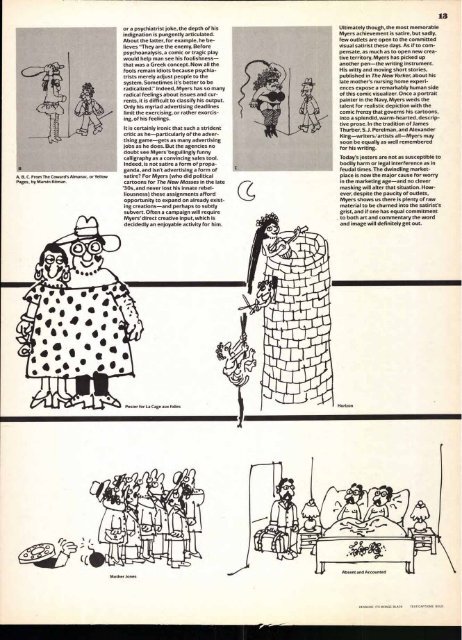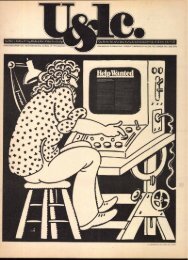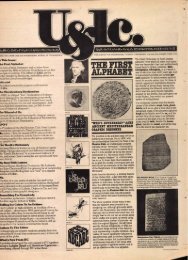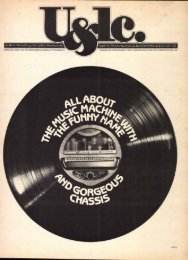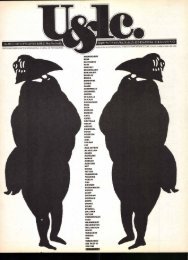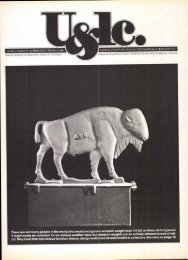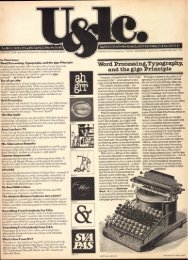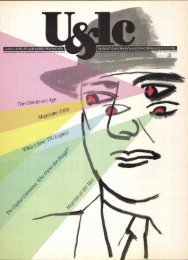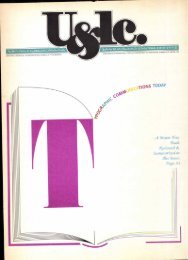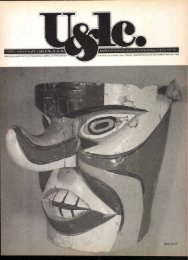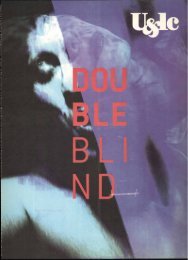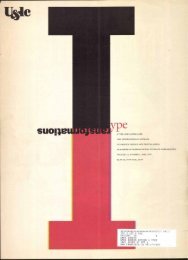Volume 12–4 (Low Res).pdf - U&lc
Volume 12–4 (Low Res).pdf - U&lc
Volume 12–4 (Low Res).pdf - U&lc
Create successful ePaper yourself
Turn your PDF publications into a flip-book with our unique Google optimized e-Paper software.
B<br />
A, B, C. From The Coward's Almanac, or Yellow<br />
Pages, by Marvin Kitman.<br />
or a psychiatrist joke, the depth of his<br />
indignation is pungently articulated.<br />
About the latter, for example, he believes<br />
"They are the enemy, Before<br />
psychoanalysis, a comic or tragic play<br />
would help man see his foolishness—<br />
that was a Greek concept. Now all the<br />
fools remain idiots because psychiatrists<br />
merely adjust people to the<br />
system. Sometimes it's better to be<br />
radicalized?' Indeed, Myers has so many<br />
radical feelings about issues and currents,<br />
it is difficult to classify his output.<br />
Only his myriad advertising deadlines<br />
limit the exercising, or rather exorcising,<br />
of his feelings.<br />
It is certainly ironic that such a strident<br />
critic as he—particularly of the advertising<br />
game—gets as many advertising<br />
jobs as he does. But the agencies no<br />
doubt see Myers' beguilingly funny<br />
calligraphy as a convincing sales tool.<br />
Indeed, is not satire a form of propaganda,<br />
and isn't advertising a form of<br />
satire? For Myers (who did political<br />
cartoons for The New Masses in the late<br />
'30s, and never lost his innate rebelliousness)<br />
these assignments afford<br />
opportunity to expand on already existing<br />
creations—and perhaps to subtly<br />
subvert. Often a campaign will require<br />
Myers' direct creative input, which is<br />
decidedly an enjoyable activity for him.<br />
Mother Jones<br />
Poster for La Cage aux folles<br />
C<br />
Ultimately though, the most memorable<br />
Myers achievement is satire, but sadly,<br />
few outlets are open to the committed<br />
visual satirist these days. As if to compensate,<br />
as much as to open new creative<br />
territory, Myers has picked up<br />
another pen—the writing instrument.<br />
His witty and moving short stories,<br />
published in The New Yorker, about his<br />
late mother's nursing home experiences<br />
expose a remarkably human side<br />
of this comic visualizer. Once a portrait<br />
painter in the Navy, Myers weds the<br />
talent for realistic depiction with the<br />
comic frenzy that governs his cartoons,<br />
into a splendid, warm-hearted, descriptive<br />
prose. In the tradition of James<br />
Thurber, S. J. Perelman, and Alexander<br />
King—writers/artists all—Myers may<br />
soon be equally as well remembered<br />
for his writing.<br />
Today's jesters are not as susceptible to<br />
bodily harm or legal interference as in<br />
feudal times. The dwindling marketplace<br />
is now the major cause for worry<br />
in the marketing age—and no clever<br />
masking will alter that situation. However,<br />
despite the paucity of outlets,<br />
Myers shows us there is plenty of raw<br />
material to be churned into the satirist's<br />
grist, and if one has equal commitment<br />
to both art and commentary the word<br />
and image will definitely get out.<br />
Horizon<br />
Absent and Accounted<br />
HEADLINE' ITC MIXAGE BLACK<br />
13<br />
TEXT/CAPTIONS' BOLD


